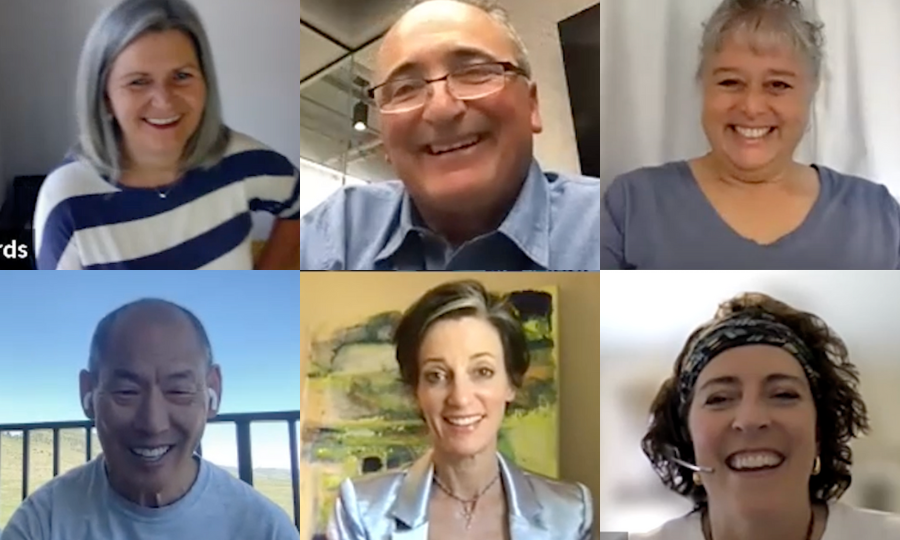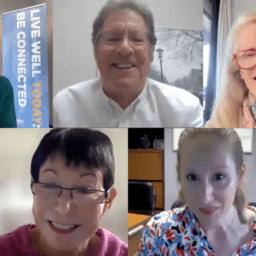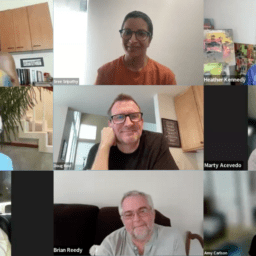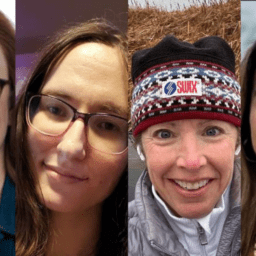Communicating effectively about your Parkinson’s is an essential part of receiving proper care, building strong relationships, and more. Join our YOPD Council for a discussion on their learned experience of communicating effectively about their Parkinson’s.
Watch the video and read the show notes below.
*Important Note: Beginning next month, in July 2022, the YOPD Council is changing names from YOPD Council to “Living with Parkinson’s: Everything you’ve ever wanted to know about Parkinson’s but were afraid to ask.” We are excited about this change and hope it will allow us to reach more people, not just those with YOPD.
The YOPD Council: communicating about parkinson’s
Read the transcript below or click here to download.
Melani Dizon (Director of Education, Davis Phinney Foundation):
My name is Melani Dizon. I’m the director of education at the Davis Phinney Foundation. And we are here today for our YOPD Council. Today, you might see a new face if you’re relatively new to the YOPD Council because Gaynor used to be on our Council. And now she’s back, she’s hopping in, this is a super fun conversation and topic. And so, we’re all giving a cheers. There’s a coffee in this one. There’s a wine in that one, it looks like Kevin has some sort of coffee and we’re gonna welcome Gaynor back. So, I’d love to do a quick sort of roundabout for the people who are new, and I’ll just call you out and you can say who you are, how long you’ve been living with Parkinson’s, and if there’s anything else that you want us to know. So, Gaynor, why don’t you get us started as our special guest for today?
Gaynor Edwards (Former YOPD Council Panelist, Founder of Spotlight YOPD):
Lovely to be back, Mel. I’m Gaynor Edwards. I run a small but perfectly formed charity in the UK called Spotlight YOPD. And these people are lovely and I miss you all.
Tom Palizzi (Ambassador, YOPD Council Leader, Davis Phinney Foundation):
Glad you’re back.
Gaynor Edwards:
Thank you.
Melani Dizon:
Yes, you too.
Robynn Moraites (YOPD Council Leader, Davis Phinney Foundation):
Hey, I’m Robynn Moraites. I’m out of Charlotte, North Carolina. I was diagnosed Friday the 13th of 2015. 11/13/15 was my D-Day. So it’s good to be with you guys.
Melani Dizon:
Thanks Robynn, Kevin?
Kevin Kwok (Board of Directors member, YOPD Council Leader, Davis Phinney Foundation):
Hi everyone. Kevin Kwok dialing in here from Boulder, Colorado. Gaynor, I just wanna say, once you’ve been a “YOPD-er” you’re always a “YOPD-er.”
Gaynor Edwards:
Forever young.
Melani Dizon:
Great, Tom?
Tom Palizzi:
Yeah, I shaved and I shaved 10 years off my age, so…
Melani Dizon:
You really did.
Tom Palizzi:
I’m coming to you from Denver today. I’m with Jenna Deidel. We’re at the Neurodegenerative Congress meeting here today and I’m taking a break out to be with y’all so good to be here.
Melani Dizon:
Oh, awesome. Nice Tom.
Tom Palizzi:
Good to see you all.
Melani Dizon:
Heather?
Heather Kennedy (YOPD Council Leader, Davis Phinney Foundation):
Tom, you’re looking fresh. All right. Gaynor. It’s so good to see you after all this time, welcome across the pond with us and Kat, I’m glad you finally got in. I had some trouble. If we don’t have technical difficulties, we don’t feel at home. I’m Heather Kennedy. And I write as Kathleen Kiddo, and I haven’t written in a while because I’m getting used to dictating things, which is really a different kind of writing. And so, it goes. We do adapt and I was diagnosed in 2011, but I didn’t believe it until 2012, even though I’d been having symptoms for 10 years.
Melani Dizon:
Wow. Thank you, Heather. Kat?
Kat Hill (Ambassador, YOPD Council Leader, Davis Phinney Foundation):
Hello everybody. I am Kat Hill, and I am in Portland, Oregon. And what else are we saying? I was diagnosed at the age of 48 in 2015. And it’s lovely to be here and to be back here after being here earlier.
Melani Dizon:
Yes, exactly. We’re having two dates today.
Kat Hill:
Yeah, yeah.
Melani Dizon:
Okay. So, today we are gonna be talking about communicating about Parkinson’s and there is, gosh, there’s a million different things that we could talk about as it relates to communicating with Parkinson’s. Interestingly as you know, Gaynor used to be on our YOPD Council, and she saw the topic and said, I’m really interested in this. This is something that I love talking about. So, I would love to start off with you, Gaynor, and is there something in particular, like when I imagine you seeing the topic and saying, oh gosh, I have something to say, like, what is that piece around communication that feels super important to you?
Gaynor Edwards:
I think, well, there’s several areas to it, but one of the main things is that’s your key to being confident in still being out there. Once you can talk about it, you can be out there, you can socialize, you still have a life. It’s once you wanna kind of keep it and hide it and you’re not comfortable talking about it. Then you just limit life generally, I think.
Melani Dizon:
Yeah, that’s great.
Gaynor Edwards:
But there is a specific thing that I want to come in on. I recently had, well recently, yesterday in fact, was hauled over the coals regarding benefits over here and trying to get the benefit system to understand properly. So, it’s how do you actually not just communicate, but how do you convey what Parkinson’s is? Because it’s just not understood.
So, I kind of have this analogy that it’s like, you know, if you have an old style car and, you know, the head gasket goes. Well fine, that that’s one issue and that’s fine, but if you’ve got a modern car and the computer system goes, and at one point it’s kind of like I’m gonna stop your ABS from working. And then the next time I’m gonna stop your power steering from working. And then you kind of stop the car. You start the ignition again, you’re alright for a little while, and then something else happens and it decides, right, I’m gonna just turn your hazard lights off, or I’m gonna jam your gear into reverse gear. And that’s kind of the analogy of it. So, it’s kind of, how do you convey that other than let me tell you about a car.
Melani Dizon:
- This is great, I think this is something that so many people struggle with. So can you talk to us a little bit about what you were trying to do, because everybody in watching this is, has issues with benefits and trying to get their benefits whether it’s disability or just their insurance to pay for things. What was it specifically you were trying to do? And then do you feel like you resolved it by being able to communicate? And what were the words that you used to get there?
Gaynor Edwards:
Sorry, you said Kat, to me or Kat?
Melani Dizon:
I’m sorry. I meant Gaynor.
Gaynor Edwards:
Okay. Well, it’s an ongoing process. I ended up by, bless her, the woman who was trying to help me ended up in tears, we were both, you know, had a little bottom lip going because, you know, she was in an awful situation as well. So, we’ve left it, that I’m going to write something and then she’ll send it on for me. And it was just this evening, no, this afternoon I was kind of pondering the whole thing and thinking, and that’s where I came up with the car analogy. So, to be continued, you’re gonna have to have a part two of this.
Melani Dizon:
Okay. I love it. And that car analogy is so good. And I saw everybody shaking their head and laughing like, yeah, you’re just gonna go in reverse right now. Okay. Apparently, that’s where we’re going. Right? So, does anybody have anything to share around that piece with trying to get that communicated in the healthcare industry? Heather?
Heather Kennedy:
I would add to Gaynor’s analogy or metaphor there by adding this, when you finally get your car to the shop and you’re like, it’s doing this and it’s doing that, and it’s not doing this or that when you get to the car shop. So, you get to the doctor’s office and you’re fine for that hour. And then you leave, and everything falls apart. So that’s another frustrating part of this disease. Also, the car itself is carrying some precious cargo that has nothing to do with the car, like our souls. We know that, you know, our souls are what we’re trying to carry, and our vehicles are becoming a cage. The car becomes then a cage. Not only do the wheels pop off, we can’t go anywhere. We’re watching the world from the cage. So, I guess in terms of benefits, I don’t have a lot to add, but I will say that it’s extremely difficult to be educating the person who’s supposed to be helping you while you’re trying to get help. And that’s what we face time and again, that’s why advocacy is everything. We need advocates. Without my advocates like Kat, like Gaynor, like all of you actually, you’ve all advocated for me at different times. Without you, I wouldn’t even be able to get through the mire of my healthcare paperwork and I’m lucky to even have it. So, let’s just start there, you know? Okay. Thank you.
Melani Dizon:
Yeah. And I think the key, that’s a really important thing. You know, all of you on here have a movement disorder specialist, and you’re lucky, right? Because a lot of people with Parkinson’s don’t and the communication is a little bit easier when people have a movement disorder specialist, because you walk into the doctor’s office and you’re fine. And you’re like, no, no, no, wait. And they’re like, no, no, no, I get that. Maybe primary care physicians and other people that work with you don’t get it. And so, and that’s what the majority of people, those are the majority of people that are working with our community of people with Parkinson’s. And so having words to help them describe what that is, is super important. Kevin, did you, you have your hand up.
Kevin Kwok:
I forgot what I was gonna say. I’m having a Parkinson’s moment here. You know, what I do know about this whole issue with disability is the ability to accurately talk about your illness. One of the things that I feel very stifled about is that, you know, as active people trying to control your Parkinson’s, we do things that are sometimes outside the norm. You know, like we might run marathons, or we might do great hikes, or we might bike or ski or do something else just to push the limits. And what I find really frustrating is that the disability folks can sometimes use your communication of pride in what you can do against you. And that just bugs the crap out of me. I’m sorry to say, but I don’t like to stifle myself, you know, for that reason, but I feel like somehow they’re the decision makers on our outcome. And so, we sort of play this game, which I find really reprehensible, enough said.
Robynn Moraites:
Well, and I’ll just add on to that as a lawyer, this is why you need a lawyer who knows what magic words. There’s sometimes you just have to include the magic words in your application or in your advocacy. And usually, it’s a lawyer who’s gonna know what that is. So.
Gaynor Edwards:
Oh sorry, I just want to quickly chip in. Kevin, if that wasn’t your point, it’s a very good point to come up with off the hoof.
Tom Palizzi:
Yeah, I think my doctor focuses on the words chronic and degenerative and you know, we’re not gonna get better per se, but like Kevin says, you go out and you do some things and it takes you a long time to do that thing at least for me anyway. But yeah, it’s a shame that they can use that against you.
Kat Hill:
I think also, go ahead Kev.
Kevin Kwok:
Every couple of months I get a notification from my insurance people, are you better yet? And then you have to show justification. And this is clearly, I mean, if we lost a limb, lost, you know, our vision, that would be a definite disability, but somehow these silent diseases where you can’t necessarily see it, they become something that we’re constantly battling.
Robynn Moraites:
Well, and it’s the way that the disability insurance system is set up. It’s kind of set up for an acute situation that gets better over time. And if you try to look at it just from people are just having to push through paperwork and rubber stamp things. I mean, you might have to argue about what it is you’re trying to get and advocate for yourself. But a lot of times they just have to submit a form showing that they did what they were supposed to do. And it’s just part of the whole system, social security administration stuff is that way as well. It just, it’s kind of kooky. Big bureaucracies make it difficult.
Tom Palizzi:
Yeah. It’s, we’re guilty until we can prove that we’re innocent, you know, it’s frustrating.
Heather Kennedy:
Yeah. And dehumanizing constantly.
Tom Palizzi:
Yeah.
Robynn Moraites:
Gary’s bringing up a good point that if doctors use the word treatment instead of management, sometimes you have to educate your healthcare provider about, you know, things.
Kat Hill:
The language to help us make our case. Yeah.
Heather Kennedy:
Gray Strong has been saying that for a long time. Thank you for repeating that because indeed management, I mean, treatment and not management, or it is treatment and not cure.
Robynn Moraites:
Right.
Heather Kennedy:
Thank you.
Melani Dizon:
Kat, did you have something that you wanted to add?
Kat Hill:
I wanted to say also sometimes we’re working so hard to stay positive, to stay in the moment, to focus on what we can do. And I know that that’s so much a part of who I am, that sometimes even for me, I get into this, oh, I’m only gonna paint the good picture when I go in, I want a good report. Right? And so, I think we also need to be honest with our providers and sometimes even be honest with ourselves a little bit about where we are. And I know that’s been hard for me and I had, it took me a couple of years to get through the disability system here and doing a lot of dance and ultimately hiring an attorney and an advocacy group to represent me because the dance felt so negative. I don’t wanna paint a picture of all that I can’t do. I wanna focus on what I can do, but it certainly impacted my ability to do my job safely and well, and consistently, and yeah. So, and it’s hard because you don’t wanna focus there, right? Yeah. I don’t have any answers.
Melani Dizon:
Yeah, Gaynor. And then Kevin.
Gaynor Edwards:
I think also you go from a situation where you are trying to convince yourself and everyone else that you are fine in your work situation. And then you get to the point where you are not fine in your work situation. And you have to turn that around 180 degrees, don’t you and actually, you know, all that stuff, which you’ve been, you know, covering up, you gotta push it out there all of a sudden. And it’s also things like when did degenerative become progressive? You know, it’s that sort of positive spin on stuff.
Tom Palizzi:
That the word progressive is associated with Parkinson’s is really odd to me, you know.
Gaynor Edwards:
Exactly, exactly.
Tom Palizzi:
We’re progressively getting worse. I dunno. I always…
Gaynor Edwards:
Yeah, good job.
Tom Palizzi:
Crazy.
Gaynor Edwards:
It’s mad.
Melani Dizon:
Kevin.
Kevin Kwok:
You guys are hitting all my pet peeves today, but the other pet peeve that I have is someone else, I think Kat you mentioned it earlier, is that with Parkinson’s, we can sway the moment of how we are just by positivity. And I find myself not always being honest and sometimes having someone else, my girlfriend comes with me to all my appointments now, because she says, that’s not what you meant, you know, I even compete with my UPDRS performance, my movement disorder specialist trying to show that I can do things more than I can. But the one thing about communication that I thought was really important was like, for instance, these calls, these webinars, right? We can man up and we can perform, we can get our voices strong. And then right after we finish, my girlfriend will come in and say, how’d it go? And it’s like, I got no voice. I can’t talk right now. I need to sleep. And it’s one of those things that sometimes our partners don’t realize that we man up for these kind events and that we’re fried afterwards. I don’t know if other people on this panel feel the same way.
Tom Palizzi:
Oh yeah. I always tell the, whenever I talk to other folks like myself that were diagnosed with Parkinson’s and the peer-to-peer kind of stuff, I suggest they always bring their spouse with them. And like, my wife keeps me honest. So, when we go to the appointment, she’s always there. And that way I can’t tell a fib, or I can’t perform. And if I do perform, she kind of brings it right back into reality for me and the doctor. And that’s a good thing. I think that’s a really good thing. I’ve mentioned that to a lot of guys on the phone when I’ve talked to them and they said, you bring your wife to your doctor’s appointment? I’m like, yeah, you really should too. It’s to your benefit.
Kevin Kwok:
Yeah. I actually didn’t invite my wife for the first decade of my Parkinson’s and that was to my detriment because I deliberately pushed her out because I didn’t want her to hear the negative things.
Melani Dizon:
Thanks Kevin that’s a big one. Let’s get back to that one. But Robynn?
Robynn Moraites:
I was gonna say, Heather had her hand raised and then I have a point after Heather.
Melani Dizon:
I didn’t see your hand. It’s like the same color as your wall.
Heather Kennedy:
I know. Sorry. I’ll have to make it like a bright color. What I was thinking about was the humiliation that comes often for us. So, if we bring a partner, who’s not a long-term partner with us, it can be even more humiliating. I mean, we’re talking about all kinds of things in there that are not really easy to discuss and what if we haven’t shared every single thing with them. And yet we’re very honest with our doctor and by the way, not all doctors can be trusted either. I don’t mean with the HIPAA, you know, I mean, I’ve had doctors who’ve said to me, have you seen a therapist in response to my DBS not working? I’m like, you put this in my brain. It doesn’t work. You can’t program it right, now I need to go see a therapist, which is probably also true, but that’s beside the point doc.
And would you say that to a dude? I don’t know. I don’t know. Would you say that to someone who is more your peer or are you looking down on me because I’m being emotional right now and getting upset after a year and a half of not having the DBS working. Also, another thing that I noticed is if I’m very quiet, like Kevin describes, they’ll say ma’am, ma’am. Is she listening? I’m like, I’m just slow. I’m not stupid. I can hear you. I’m slow because I can’t get my, she’ll say I need your card. I was at an office the other day and she was yelling at me, and I brought a friend with me this time and she couldn’t, my friend was like, she thought I had been exaggerating all this time. And this was in the urologist not to be confused with neurologist. Anyway, I’m gonna give them a little piece of my mind in the form of a letter. Not that anybody will read it, but it’ll make me feel better temporarily because you need to be a good advocate for everyone and say, hey, guess what? Dignity is important. Thank you.
Robynn Moraites:
Well, and to that point about putting things in writing, several people in the chat have said things like, how do you start this dance or, wow, my doctor makes very minimal notes in my record. So, this is where you get to be your own advocate for since the beginning of my situation, I wrote down all my major symptoms I was having, and I gave it to my doctor on the paper. And I said, here, I want this as part of my medical record. Also, those email chats that they have these portals now, these patient portals, I think it’s really important to sort of switching the gear now into sort of just standard care. It’s really important that you dictate the terms of your medical appointment with your doctor. And so, what I do, one of the strategies I do is I don’t write down stuff every day, but if I’m having a particularly difficult flare up of something.
So, this past week I had my first bout of dystonia in my back muscles, that was fun. And I couldn’t even walk. I couldn’t, I was in excruciating pain, but you know, I’m just taking a note to tell my doctor to talk about it. And I also email in the portal. This is what’s happening. We need to talk about this at my next appointment. So, it becomes part of your record and you’re making sure it becomes part of your record by giving the paper to the doctor and saying, I want this as part of my record that we’ve talked about these things. So, I also think, I also think, I don’t know, my anecdotal observation is I really believe women are treated differently in the medical system than men are. And when I went for my very first appointment of like, something’s wrong, I literally had a neurologist tell me you’re not impressing me.
And he was kind of rolling his eyes at my reports. And then at the end of the whole thing, he said, well, we’re living in a first world country. We’ll use a first world solution. We’ll get you an MRI. And I said, look, if you think I’m being a hypochondriac and that this is just nothing then, and I declined the MRI. I was like, you know, if I’m just, you know, imagining this or whatever, but my chiropractor insisted that I go back and see him about six months later because my chiropractor had noticed that my tremor had increased and I went back, they had a last-minute cancellation on a Tuesday morning appointment. So, I got in really quickly, well, my previous appointment had been on a Thursday at like four. And the difference in the energy was astounding. The doctor was polite, professional.
And I said, look, you can see, my tremor is worse. He said, I can see that. And I said, when I was here last time, you said to me, and I told him what he said to me. And he was horrified. He was like, I said what? And I said, yeah, you told me that I wasn’t impressing you. And that it was a first world, we’re living in the first world. So, we’ll do a first world solution. And so, at that point I started becoming my own advocate and I realized it was so difficult for me to get a proper diagnosis and care. I mean, he put me on, I mean, it’s just interesting to me, he gave me a bunch of samples of Rytary to give me the levodopa challenge. And so, and he referred me to a movement disorder specialist at Beth Israel.
And anyway, that was neurologist number three, by that point. And it was like so hard to bysh whack my way into getting good care. And that by the time I got to neurologist, number four, I was still on the levodopa challenge. I mean, this had been going on for six or eight months. And the neurologist number two was still giving Rytary samples. I mean, it was just, it was crazy. And I told neurologist number four, I said, listen, if you’re gonna be my neurologist, I need to know that you’re gonna call me back, because if we’re gonna try some different medication, I cannot wait. If it’s not working, I can’t wait six months to see you again for that medication to not work. And he was sort of nodding his head. Also, he was way better neurologist than the other three, but he was like nodding his head.
And I literally said, I want you to say to me, Robynn, I promise I will call you back. And he said, Robynn, I promise I will call you back. And I’m glad that he made that promise. And he did because he put me on ropinirole, and that was a very short-lived experiment. But you just, I just, I feel like I have to be pushy, and I used to work in the medical system and I’ve advocated for all my elderly relatives because I worked in the medical system in a sort of an adjunct way. And so, I know that they needed advocacy and we need advocacy too.
Gaynor Edwards:
I think we all have to be pushy if we wanna make progress with this. And people aren’t vocal enough, are they?
Tom Palizzi:
I’ve made it a point to pursue mainly women doctors? I think all my doctors except for one is a woman, because I think what I’ve noticed is they care so much more than the guys do. I just, I’ve never, I’m not sure if I’d ever go back to a male doctor unless I absolutely had to. So, I mean, even my dentist is a as a woman. Cause again, they care more. They think about things more. They’re not there to impress anybody. It’s exactly the opposite.
Melani Dizon:
That’s fascinating. And Gray says, I second that. Chris says, I agree, interesting. I mean obviously case by case, but certainly something to think about. If you continue to not have success with a certain doctor. I wish that we could do a day in the life of everybody here. And then we just send these videos to all the insurance companies and all the primary care physicians. And we’re like, here’s what a regular day looks like. Does this seem like this is like somebody who should be going to work eight hours a day and 12 hours a day? No, they’re…
Kat Hill:
24 hours a day.
Melani Dizon:
Yeah. Right. That’s crazy. This is good, so Pamela Quinn, Hi Pamela, I’m so glad you’re here. What do you do when your doctor glosses over something you bring up? My impression is that they are unwilling to admit that they don’t know the answer.
Robynn Moraites:
That’s my impression too.
Kat Hill:
I think it’s fair to come back to it. I think it’s fair to come back to it. Yeah. I think it’s fair to say, I know we, I touched on this, but I really didn’t hear an answer. What are your thoughts on urinary frequency or, you know, constipation or tilting to the side, you know, whatever it is. I think it’s really fair. You are paying for their consultation. You are a consumer of healthcare and having been a provider, knowing that patients can pick and choose who they see. You can do that. And if you don’t get the answers that you like consistently, it’s okay to change providers. If you don’t like a grocery store you shop at, you go somewhere else. We are consumers of healthcare. You pay or our insurance pays for the service that they’re providing. If you don’t like the service, change the venue.
Melani Dizon:
Yeah. And I think that in, I would suspect it’s the same in Canada. In our country, we are told from the very beginning of time, doctors are up here, and we are to believe what they say. We believe their advice, their everything. And so, we’re not as used to challenging them. And you certainly don’t get used to challenging your doctor in your early years. You just don’t, you just go, and you’re used to getting the provided care and then you move on, and you have to start really early holding them to their, to what they’re saying. I mean, this is especially true in like the world of nutrition doctors will tell you the craziest stuff. And you’re like, well, you don’t know anything about nutrition. You had like four minutes of nutrition class when you were in medical school.
And you’re talking about things that have been, you know, clearly not the case for decades. And it’s fair to question them and to make sure that they’re not just, and a lot of them aren’t expecting it, right? Like I would suspect that a lot of you have had interactions with doctors. They weren’t expecting you to call them out. They weren’t expecting you to say hey, this is not right. And some of them will respond, right? So yes, find the place that’s gonna treat you the way you deserve. Gaynor, and then Tom.
Gaynor Edwards:
Just to say, that can really chip away at your confidence as well, can’t it? Kind of, if you have a doctor who is just little things like maybe in the letter that you get back, that you get copied in from maybe your movement disorder specialist to your primary care doctor, if it works that way over there, that’s how it is in the UK. They might say something like you know, patient complains of. I wasn’t complaining. I was, you know…
Kat Hill:
That’s standard training though. Yeah. And it needs to change instead of complains of, because I took those notes for decades in school. And when I was a nurse practitioner, that’s a standard way you start your note and you can ask your provider to say, can you just say patient reports instead of complaints of. And I think that’s really fair because it’s called a chief complaint. That’s why you come into the office. And so, our whole system from the very foundation of how providers are trained are given that language. And you talk about changing our narrative physicians over time are gonna need to change their narrative. And I think we can be direct with them, and it doesn’t mean you have to get in an argument or be confrontational. It just means that you can have a dialogue with them and ask for certain things and you can even just practice saying, oh, I wanna partner with you in my healthcare. If it starts to feel uncomfortable, I just wanna partner with you in what we’re doing. This is my body and my experience. This is my Parkinson’s. I wanna partner. That’s a nonthreatening word. So, I sometimes even have to practice before I go in, you know, these are the things I wanna say. And I wanna be sure that if it gets difficult, I just wanna use these words. So even write it on a notepad, if it helps.
Tom Palizzi:
Yep. I do the exact same thing, Kat, and I use that same terminology. In fact, I actually interview my doctors before I go to them. So, I’ll narrow it down to a few, like when I saw Olga at the University of Colorado for 11 years straight. And she practically became a family member. And then one day she left the practice and went into research and I was like, oh, what am I gonna do? So, I said, you can’t leave until you give me a couple of references. And so, she gave me a couple references and I interviewed ’em all and actually truth be told, I’m now seeing Dr. Drew Kern, a guy, but I see him primarily because he’s in Boulder and that’s close to me.
And I like, we’ve gotten along real well. I gave him like, you know, a year to see how it would go, but there is a continuity point through the physician’s assistant who’s a young lady who connected the two doctors for me. And that’s, it was really very smooth, but it took work. I didn’t just accept whatever doctor they were gonna pass me off to. So again, you have to advocate for yourself and you have to be knowledgeable enough to know what kind of questions to ask. So, you gotta understand what visit you’re having and what you’re dealing with. And I think that’s the best path forward for people with Parkinson’s.
Melani Dizon:
Yeah. And I just wanna make a quick note for the people who are watching that do not have choices. The keys there are to remember, like the things that everyone said, make sure it’s in your record, use it in your, in the email chat, take the list with you. I gave you the link of all of the worksheets, take those, print them out, fill them out and take ’em to your doctor and put ’em in your record. You don’t, right now, you might not have a choice, but you might have a choice soon. And so, everything that you’re doing is preparing for that. So, okay. Was that Kevin, did you have something?
Kevin Kwok:
Yeah, so I wanted to echo what Tom said, I recently switched over all my care providers from California to Colorado after moving here. And I see several of the same people you mentioned and they’re all, stellar, but the point that I wanted to get back to what Kat talked about is the training of clinicians. As a clinical pharmacist, we were taught what’s called soap notes. Soap stands, is an acronym that stands for subjective, objective, assessment and plan.
Kevin Kwok:
And the subjective is always patient complained of X dystonia. Patient complained, and what they do is if you read the notes on someone who’s been trained during my era, you’ll see very methodically how they go S O A P of every complaint or symptom that you talk about. And what happens oftentimes is you lock into the symptom, and you don’t think about the totality of the patient and that’s what I find very frustrating about, God, I have a lot of frustrations today, huh. But I find that that SOAP approach is very antiquated when you talk about someone that has every system in the body involved. So, let’s change the medical system, right?
Tom Palizzi:
I’m on it, bud.
Kat Hill:
And the insurance system. That’s all.
Tom Palizzi:
Good luck with that one.
Kevin Kwok:
Two tasks.
Melani Dizon:
We are, we’re getting close to the end. I wanna honor everybody’s time, but I wanna go back to Gaynor, what you said at the beginning. Cause I think that this is I’d love to hear other people’s experience with it, but you started and mentioned the ability to own and to tell people that you have Parkinson’s and that when you do not do that, you suffer and also the people in your life suffer. So, can you tell us a little bit about what that meant for you, and then if anybody else wants to share, if there were times where you actually didn’t tell people and you held onto it, what was that? And then what made you tell people? So Gaynor, you wanna start there?
Gaynor Edwards:
Well, I know from experience from other people’s experience where they kept it quiet, I came out quite early with my Parkinson’s. I put it in my company newsletter three months after I got diagnosed as it was the Christmas newsletter and Titan charity begins at home.
Melani Dizon:
You really took the Christmas letter to a whole other level.
Gaynor Edwards:
Exactly. Exactly. It told you which ones had read it properly as well. And happy Christmas to you. No, I don’t think you paid full attention though. But, some people have contacted me and they’ve kept it quiet for years. And I think that the pressure of that, the lack of information and it, I think it, you know, there’s that whole thing about Parkinson’s makes you smaller. Well, I think by doing that, you’re making yourself smaller. You’re making your life smaller because to be able to still socialize and talk to people and kind of be comfortable with who you are, to get to that level of acceptance, you know, that’s, it’s authentic. And that’s what it’s all about really. Otherwise, you know, you’re just living a lie or keeping a secret aren’t you?
Melani Dizon:
Does anyone else have a story about that?
Tom Palizzi:
I agree with Gaynor. I came out right away as well, and it wasn’t you know, I debated it quite heavily because, you know, it’s a life changing thing. But I told my business partners right away because I felt I had the fiduciary responsibility to the company that I was partnered with as an owner. And I owed it to those guys that they knew where I was at. And of course, they asked if I wanted to keep it a secret from everybody else. And I said, well, my staff I’ll just wait till they find out. Well, it was about two or three days later. Someone must have found out. But it was just so much easier to go through without having to hide behind the curtain, you know, and it was just so much easier to be up front with people and they were very gracious and very accommodating and very helpful. So, I couldn’t see anything negative about doing that. I know that might not be true for everybody, but it worked really well for me.
Robynn Moraites:
I took the other path. I did not tell anybody until I had deep brain stimulation.
Melani Dizon:
So how long was that period?
Robynn Moraites:
Five, six years. So not that I didn’t tell anybody, but like in my work life, nobody knew at work. It was very much a secret. And it was in some ways I felt very isolated because I felt like there was like a Plexiglas wall, like a cone of silence or something that I knew something and they didn’t, not that all of the details of my life are fodder for everybody’s, you know, viewing pleasure, but there was a point when it started to feel dishonest by not being my most authentic self. And yet I don’t think I’d do it any different way. Some people are treating me a little bit differently now, usually the first, I mean, I could be like jovial at a quarterly bar meeting, laughing and talking with people and someone will have not seen me for a couple months.
And the first thing they say is, how are you? It’s like, I’m fair to Midland. Do you see me socializing with all these people? And so, it does change the way that people interact with me, but I’m comfortable now. I think that some people are shocked at how cavalier I can sound about certain things, but it’s just the reality of my situation. So, I took the opposite path, but my life didn’t get smaller because of it. It was just, I had a very public position. I did a lot of public speaking across the state, and I just didn’t want it to be the first thing people know about me. And a lot of people still don’t know, but I’m definitely out now.
Melani Dizon:
Kevin.
Kevin Kwok:
Yeah. I’m with Robynn on that. I was, you know, in a service industry role where you just, you feel like if you tell people they’ll treat you differently and they do, but I’d have to say the trade-off of being honest and coming out at the time of my DBS really was liberating and that liberation is worth a lot.
Tom Palizzi:
I was always real impressed with the response I would get. People would be kind of shocked at first, you know, especially the guy on the airplane that I had a stare down with because I froze the aisle and he’s like 10 times my size. And he is like, what do you want, buddy? What do you want? I’m like, dude, look, it, I’m not looking at you. I’m frozen. And so later on, he came back down the aisle and sat down next to me. He says, do you mind if I sit down? I said, sure. He goes, tell me more about Parkinson’s, my great-grandfather had Parkinson’s. I think it may run into my family. So, it turned into an amazing education moment for me. I was like, I can’t believe this guy is like back here sitting next to me now. But that was really, really kind of cool but I’ve always found that people will kind of treat you differently. But the other thing that they always say is, well, I got this, or I got that. And I always tell ’em, you know, we all got something right, and Parkinson’s, you know, it’s what I got. It’s what I got. It’s certainly not the only thing I may get, but right now that’s what I’m dealing with. And I, you know, extend a hand, an olive branch.
Heather Kennedy:
I love when that happens, Tom, I was gonna say that, but I also wanted to add there’s something else that happens. It’s not as simple as you just tell them you have parks. Oh, it’s all good now. They have no idea what that means. They’re like, oh, you shake a little? You okay? Yeah. Okay, great. The next day you seem better and they’re watching it. And I like to do…
Tom Palizzi:
Of course they didn’t see the guy get on the airplane.
Heather Kennedy:
Yeah. It’s like what? What do you mean I seem better. You mean like the last five minutes? It’s called medication or when parents are with their kids, I like to go, I’m a robot. And then I do this. And then when their parents turn back around, I’m like and the kids are all like, mom. It’s so much fun. If we don’t have fun with it. Someone accused me of making fun of Parkinson’s one time. And I’m like, you know what? It’s so that I don’t cry. You don’t wanna see the ugly cry. Isn’t a laugh a little bit easier? I mean, what are we gonna do? When I’ve been frozen in the aisle like that too and the guy actually thought I was hitting on him. He goes, hey.
Melani Dizon:
That’s great. The guy thinks the guy is ready to fight him. And the guy thinks the woman is trying to, you know, hang out with him. That’s great.
Tom Palizzi:
Well, let’s start traveling together, Heather.
Melani Dizon:
Right. Kevin, do you have your hand up again? I don’t know if it went down and came back up.
Kevin Kwok:
Well, I meant to put it down, but I’ll just echo. I tell everyone that my DBS monitor allows me to read your mind and it really unnerves people when I tell them that.
Melani Dizon:
Yes. Good. Let’s see. We have another really big topic that I wanna address, but I think we’re gonna have to hold on that. We can talk about it. I think we’re just gonna talk about this again next month, because there’s just a lot more, I don’t even think I got to any of my bullet points. And we had a really great discussion. So, maybe we can talk about this again. I don’t think anybody would be sad about that.
Heather Kennedy:
Don’t tease us. I want to do it now.
Kat Hill:
And next month…
Kevin Kwok:
The only thing is that Gaynor’s gotta come back.
Melani Dizon:
Yes.
Heather Kennedy:
I might be washing my hair.
Melani Dizon:
Yeah. And for those of you who are on today and are gonna watch the recording, we have a little bit of an announcement. So, we’re gonna share it with you today. The YOPD Council is going to change its name and the new name for the group is called, well, the session, the event is called Living with Parkinson’s, everything you’ve ever wanted to know about Parkinson’s, but were afraid to ask, and now we’re gonna be sharing it farther and wider than we have in the past. We have a lot of YOPD people here, but we also have a lot of people that are not YOPD that come to these sessions every single month. And we just wanna make it a little bit more available to everybody so they don’t think, oh, that’s not for me.
You know, all of, every single solitary thing that we talked about today is true whether you have YOPD or you were diagnosed, you know, at 70 years old. So those are all important things to talk about and we will be giving you more information. We have a really cool new logo. I know that no one else really cares about this, except the people that are like putting it out there, but we’re excited. It looks super cool. Maybe we’ll even have t-shirts who knows. So that part is great. And I will make sure that I send you all the recordings for everything. Thank you all so much for coming and thank you, Kevin and Heather and Tom and Gaynor and Robynn and Kat, really great conversation, and I know we’ll pick it all up again next month.
To download the audio, click here.
Show Notes
- One of the challenges people with Parkinson’s face is how to explain Parkinson’s to others? It is not an easily understood diagnosis and is even more difficult to explain. One analogy that can be used is by comparing Parkinson’s to a modern car: In an old car, if one part breaks, that is fine, you can fix it. However, in a modern car, if the computer system breaks, there is no telling what will happen to the rest of the parts. The car could suddenly start going in reverse, even without being told to. The horn could stop working or be a lot softer. In a modern car, even when you know exactly what the problem is, it is impossible to fix it because the main issue is the computer system, which would need to be entirely replaced. That computer system is Parkinson’s affecting the brain and the body.
- One of the best ways we can advocate for ourselves at the doctor and with friends and families is by making sure we have and can communicate relevant information. Our panelists suggested writing down major symptoms and making sure your doctor inputs them into your chart. Another suggestion is to take an advocate with you to appointments, whether it is a long-term care partner, a lawyer, or even a friend. This way, if your symptoms prevent you from explaining your concerns, someone else can provide additional insight. We shared a link to many of the checklists and worksheets we have that help people better prepare for working with their healthcare providers. You can find them here.
- An issue many people face when explaining their Parkinson’s is language usage. Make sure you use consistent terminology so others around you can be trained to understand what you are going through. You may choose to refer to Parkinson’s as a “condition” or “chronic illness” rather than a “disease.” You may explain that you are seeking “management” options, not “treatment” or a “cure.” You can find other resources on language usage here.
- Getting access to disability services can be frustrating. Many insurance companies have check-ins where they ask if you are “better,” even though Parkinson’s is a chronic and degenerative condition. Others will ask for “proof of illness” even though it has been given many times. Use lawyers if you can. Find advocates who will help you cut through red tape, read forms, or just talk you through the process. We have resources for how to get access to disability services here.
- Give yourself grace when it comes to being open about Parkinson’s. Some people “come out” with their Parkinson’s within a few months of diagnosis while others wait years. The most important thing to understand is that coming out will help you find better doctors, more resources, and, most importantly, freedom. Parkinson’s can sometimes make us feel small, but we cannot let it.
- If you do not have access to other doctors or the ability to interview and try out several, keep the following ideas in mind:
- Use your doctor’s patient portal whenever you have a new symptom or question. When you use the patient portal to communicate, you are making it part of your medical record, and that can help down the road when you need to remind your doctor, make a case for better care, or need to share notes with insurance providers.
- Return to questions your doctor brushes over and make sure they have an answer.
- Do not let doctors dismiss your symptoms or feelings. If your Deep Brain Stimulation (DBS) device is not working, you do not need therapy, you need your neurologist to fix it. Make sure you make them listen.
- Fill out our worksheets and bring them to your appointments. Make sure they go into your chart so that all the information is available.
Missed this webinar? join us next time!
The YOPD Council meets on the third Thursday of every month, and every session is recorded and shared for all to access. Register for the YOPD Council series here, after which you will be invited to join live and notified when a new webinar recording is posted. Are you interested in catching up on past YOPD Council webinar recordings? You can find all recordings on various subjects on our YOPD Council Youtube playlist, and don’t forget to subscribe to our channel to be notified when new Youtube content becomes available.

















